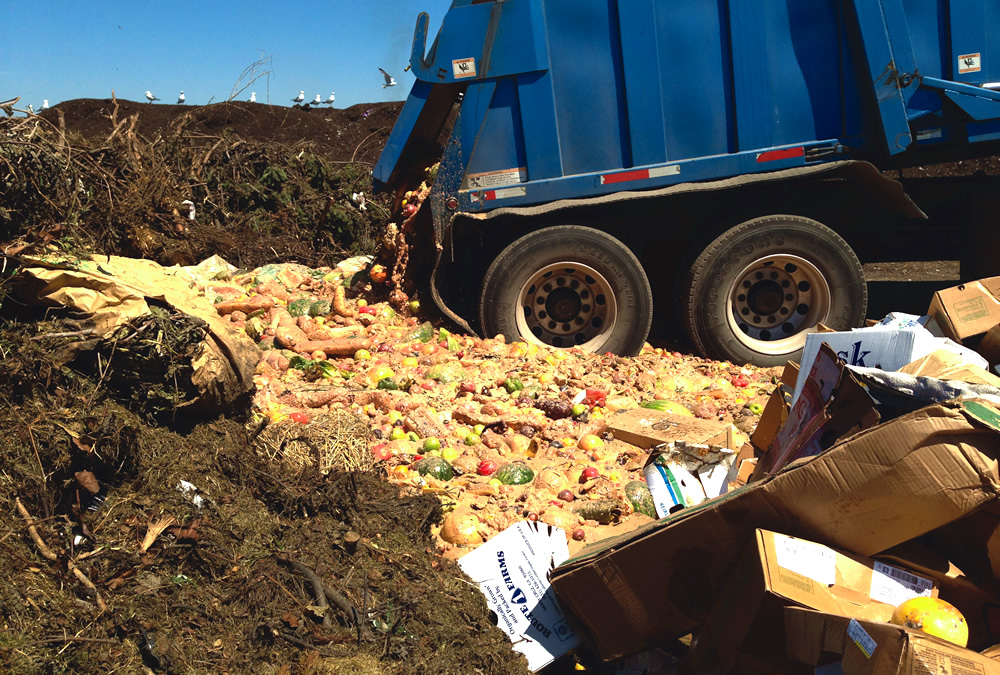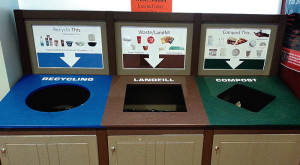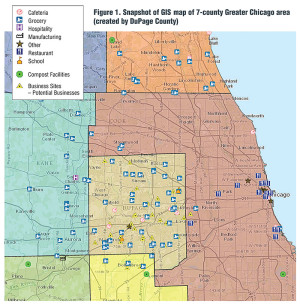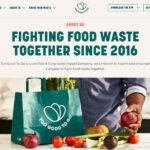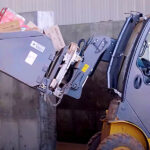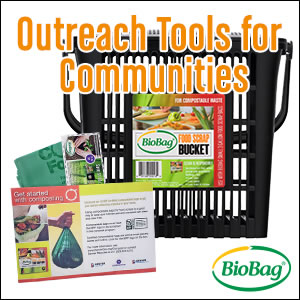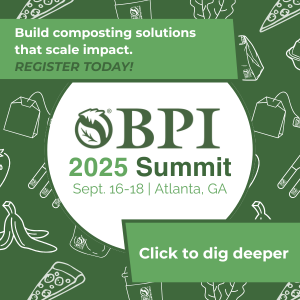Illinois Food Scrap Coalition is focusing first on commercial collection programs to provide volume of food scraps necessary to promote route density for the haulers and foster growth of additional processing facilities.
Jennifer Jarland
BioCycle September 2014
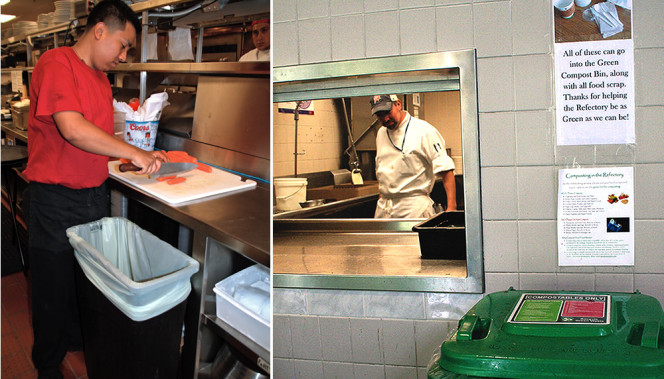
Kitchen scraps collection at Kings Bowl (left). Signage on acceptable materials and organics diversion program at the Refectory at Lutheran School of Theology (right). Photo by Stephanie KatsarosPhoto by Hanh Pham
Food scraps recovery is on the minds of most resource management professionals as initiatives ramp up to tackle the largest portion of the waste stream. Nationally, food scraps make up 21 percent of municipal solid waste, according to U.S. EPA data. In Illinois, a 2009 waste characterization, funded by the state, found that approximately 13 percent of landfilled waste is food scraps. Since the Illinois Solid Waste Planning and Recycling Act mandated action over 20 years ago, recycling program managers have been working to increase recycling rates and divert yard trimmings since they were banned from landfills in 1990. In addition to maximizing recovery of those materials, program managers are now addressing food scraps recovery as a way to efficiently utilize resources.
In spring of 2012, a small group of Illinois county recycling program coordinators and other stakeholders convened to share information about food scraps programs and composting sites in Northern Illinois and discuss opportunities for increasing food scraps recovery. The group organized its first outreach event, a half-day forum called “Waste Not – Advancing Commercial Food Scrap Collection in the Chicago Area” at a GreenTown Conference in Highland Park in October 2012. The group formally became the Illinois Food Scrap Coalition (IFSC) as of that December, when it wrote a letter to the Illinois Department of Commerce and Economic Opportunity (DCEO) to commend the agency’s Food Scrap Grant it manages and encourage its continuation.
The Coalition then set out to recruit a diverse and engaged membership and develop a scope of work related to advancing food scraps composting in Illinois, through program implementation, policy and advocacy. Less than two years later, IFSC has grown to over 100 members from multiple sectors, including local and state government, solid waste agencies, state associations, institutions, for profit and nonprofit businesses, community organizations, haulers and processors. Several highly active IFSC committees now focus on the multifaceted aspects of advancing food scraps recovery in the state, including researching and promoting best practices, pooling resources, facilitating an increase in infrastructure and end markets, and inspiring others to take the plunge into organics recycling.
Policy And Regulations
In 2009, Public Act 96-0418 was passed by the Illinois legislature, making it possible to site a new or expand an existing commercial food scraps composting operation in Illinois without going through the state’s lengthy and expensive local siting law. This piece of legislation took three years to pass and significantly advanced the ability of composting businesses to develop facilities. In 2013, Public Act 98-0239 was passed to remove permitting requirements for very small (under 25 cubic yards) processing sites and expand opportunities for urban and suburban farms to compost.
“The cooperative process between stakeholders has led to a successful food scrap composting law in Illinois, which has allowed the diversion of large amounts of organic waste from landfills,” explains Jen Walling, Executive Director of the Illinois Environmental Council, who was involved in the legislation. “These laws directly contribute to job growth and environmental protection.” Walling adds that the IFSC is working with the Illinois Environmental Protection Agency to form a stakeholder group focused on the development of anaerobic digesters for managing food scraps and other organics in Illinois, with a specific focus on developing appropriate laws and regulations. The IFSC continues to make recommendations for policy and infrastructure change in the state of Illinois that are achievable and do not create mandates that cannot be met due to insufficient infrastructure.
Processing Infrastructure
There are 11 haulers in the state that are known to collect food scraps; 21 of the 46 permitted composting sites in Illinois report that they may accept other organic materials such as food scraps in addition to landscape materials. Hundreds of businesses are participating in commercial composting programs in the Northern Illinois region, including groceries, restaurants, institutions and conference centers. Most of the action is occurring in the northern part of the state central to the greater Chicago area.
In May 2012, DuPage County created a GIS map for the 7-county Greater Chicago area (snapshot of map in Figure 1) that visually depicts food scraps composting initiatives, including cafeterias, groceries, hospitality businesses, manufacturers, restaurants and schools participating in a collection program. The map, last updated in early 2014, also identifies four composting facilities receiving food scraps in the Greater Chicago region. The goals of the map are to illustrate infrastructure gaps and to educate policy makers on the growing demand.
In order to build infrastructure, Illinois stakeholders have chosen to focus initially on commercial and institutional generators of food scraps. Restaurants, businesses, grocery stores, stadiums and other large venues provide the higher volumes of clean food scraps necessary to promote route density for the haulers and to foster growth of additional processing facilities. In the long term, this will more easily enable counties and cities to introduce residential food scraps collection programs. That said, it is essential to note that residential pilot programs have already been conducted in Barrington and Highland Park, as well as Oak Park, where there is now a permanent voluntary program.
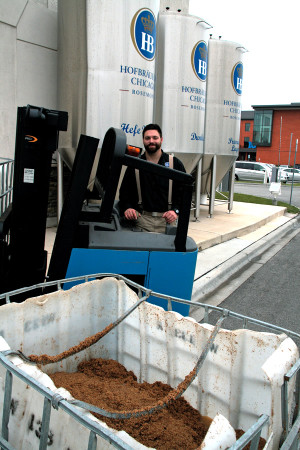
Spent grains from Hofbräuhaus, a German beer hall, sent to a local farmer for cattle feed. Photo by Stephanie Katsaros
Challenges And Solutions Project
The IFSC received a grant from the Illinois DCEO this year, which will fund a project to research policy and best practices, deliver stakeholder forums across Illinois, and create an analysis and recommendations report. “The inspiration for this Food Scrap Composting Challenges and Solutions in Illinois project was a BioCycle article on a similar initiative in New York State to bring together stakeholders,” recalls Gary Cuneen, director of Seven Generations Ahead. “This is another great example of how BioCycle has been such a catalyst for composting initiatives across the globe.” Seven Generations Ahead, an Oak Park-based environmental nonprofit focused on sustainable communities, is working in collaboration with IFSC to support the overall project, serve as fiscal agent, manager and administrator of the project, and lead the research/writing team. Specific tasks include:
Research: The project team will conduct research on policies, economic models, infrastructure incentives and strategies, and commercial and residential food scraps composting models. This research will draw from best practices and examples across the country, paying particular attention to localities with some of the same characteristics facing Illinois. The team will consult with the US Composting Council, BioCycle, and other pertinent groups concerning research to avoid duplicate work and to seek their knowledge on prior research consistent with the goals of this initiative.
Stakeholder Forums: The IFSC held one forum in Chicago in May 2014 and will organize and implement five more forums across Illinois designed to: Educate Illinois stakeholders about policies and statewide approaches that are diverting food scraps from landfills and advancing composting across the country; Engage stakeholders in assessing barriers and opportunities; and Solicit stakeholder recommendations for solutions that will advance food scraps composting in Illinois.
Report: The final report will include an assessment of the challenges, barriers, and opportunities for food scraps composting in Illinois as well as recommendations for policy and infrastructure solutions that will advance the practice in the state. The report will incorporate analysis and recommendations related to composting facility siting and regulation; best practices in odor control and contamination reduction; infrastructure development; municipal and state policy; economic opportunity assessment; collection, transportation and route density; end product quality standards; sales and distribution of compost; and education and marketing.
The team will utilize analysis and recommendations gathered in the forums and articulated in the report to prioritize, advocate for, and advance specific policy and strategy recommendations. The recommendations will be forwarded to the Illinois Task Force on the Advancement of Materials Recycling and become part of the statewide dialogue on the broader goals of decreasing dependence on landfilling, increasing material diversion rates, creating economic opportunity and advancing environmental sustainability goals related to water, soil and air quality and reduction of greenhouse gas emissions. The IFSC will prioritize recommendations, and work collaboratively with all sectors and stakeholders to promote the policies and strategies, which are in the best interests of Illinois residents.
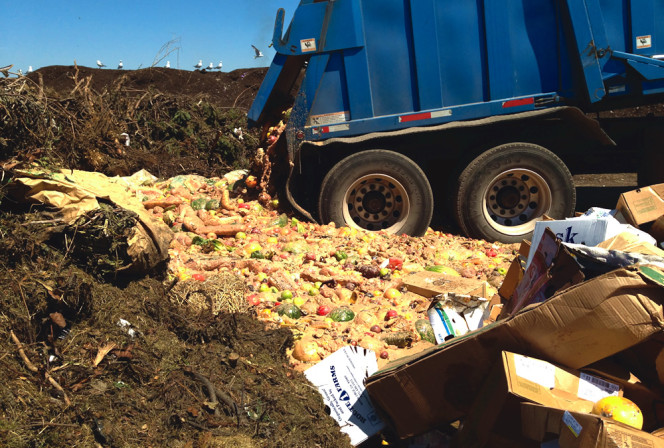
Food scraps unloaded at Land and Lakes’ source separated organics composting facility in Chicago. Photo by Stephanie Katsaros
Recognition Program And Toolkit
In March 2014, IFSC’s outreach committee created We Compost, a recognition program that promotes businesses and institutions participating in a commercial composting program and encourages the public to support businesses that are managing their food scraps responsibly. Program participants are recognized as gold or silver partners on the website and receive a window decal to place on their front door to communicate to customers that they participate in composting. To date, over 80 businesses have qualified for the We Compost program. The growing number of restaurants and venues in the food scraps collection programs indicates that there is interest and potential for viable infrastructure and program growth that will help divert the estimated 5,036 tons/day of food scraps sent to Illinois landfills (1,838,100 tons/year, based on 2009 Illinois waste characterization study). The photos provide a sampling of some of the participants.
To promote food scraps composting in commercial food establishments, the outreach committee developed a Restaurant Compost Toolkit for businesses interested in evaluating and implementing food scraps programs. The toolkit, available on the IFSC website, includes a how-to guide, an easy to follow checklist that shows how to set up a successful food scraps separation program, case studies, video interviews of participating restaurants and institutions, and frequently asked questions that address basic questions and best practices.
Market Development
As more and more restaurants and households divert food scraps for composting, the need will grow for more buyers and sellers of compost to take full advantage of this valuable product. In Spring 2014, the IFSC market development committee surveyed 50 organizations that use compost for applications ranging from landscape design to large-scale agriculture (see http://ifscsurvey.blogspot.com/). Respondents generally indicated that their use of compost is set to increase in coming years, but other indicators show a lack of clarity and standardization in compost markets. For example, less than 10 percent of respondents reported that the compost they buy is labeled with feedstock, geographic, or third party certification information. All of these factors are important parts of building strong and reliable local compost markets.
This committee is focused on discovering and publicizing key applications for compost containing food scraps. It is also raising awareness among potential buyers of compost and organizing opportunities for companies and individuals to purchase food scrap compost made in Illinois. Four fact sheets have been developed for outreach purposes: Landscape Industry, Compost Quality, Government and Construction, and Universities and Schools, all of which can be found on the IFSC website.
The time is ripe and the Illinois Food Scrap Coalition is ready for the challenge of moving forward with food scraps composting in Illinois to divert more organic material from the landfill, while recovering valuable resources and reducing emissions. To learn more about the Illinois Food Scrap Coalition, visit IllinoisComposts.org or facebook.com/IllinoisFoodScrapCoalition.
Jennifer Jarland is the Recycling Coordinator for Kane County in Illinois, a Director of the Illinois Recycling Association Board, and a founding member of the Illinois Food Scrap Coalition (IFSC). Members of the IFSC provided content and details for the article.
Literature Cited
Illinois Commodity/Waste Generation and Characterization Study (see Table 2-25. Illinois Landfilled MSW Sector Tonnages. http://www2.illinois.gov/gov/green/Documents/Waste%20Study.pdf).


